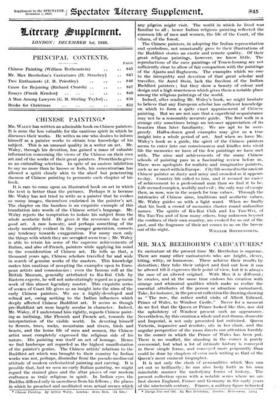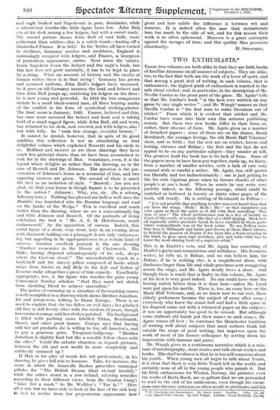MR. MAX BEERBOHM'S CARICATURES.*
IN caricature at the present time Mr. Beerbohm is supreme. There are many other caricaturists who are bright, clever, biting, witty, or humorous. These achieve their results by distortion ; they take their subject and find out how it can be altered till it expresses their point of view, but it is always the case of an altered original. With Max it is different; he creates, and at the same time endows his creation with strange and whimsical qualities which make us realize the essential attributes of the person or situation caricatured. Take, for instance, in the present collection the drawing showing us " The rare, the rather awful visits of Albert Edward, Prince of Wales, to Windsor Castle." Never for a moment do we feel that the Queen or Prince looked like this, nor did the upholstery of Windsor present such an appearance. Nevertheless, by this creation a whole and real drama, domestic and Imperial, is not only presented but criticized. Queen Victoria, impassive and resolute, sits in her chair, and the angular perspective of the room directs our attention forcibly to the corner in which the Prince of Wales has been put. There is no conflict, the standing in the corner is purely ceremonial, but what a lot of intimate history is conveyed in these simple forms, and conveyed more poignantly than could be done by chapters of even such writing as that of the Queen's most eminent biographer.
It is not only the clash of personalities which Max can set out so brilliantly ; lie can also body forth in his own inimitable manner the underlying forces of history. The present collection opens with a notable series where we are . first shown England, France and Germany in the early years' of the nineteenth century. France, a military figure helmeted.
• Things New and Old. By Maz Beerbohm. London: lielnemana, 12,`",1 -
and eagle beaked and Napoleonic in pose, dominates, while a subservient Goethe-like little figure bows low. John Bull sits at his desk among a few ledgers, but with a sword ready. The second picture shows John Bull of vast bulk, more policeman than soldier—this is a subtle touch—leading off a diminished France. It is 1815. In the 'forties all have turned to civilians, Germany smokes and meditates, England is increasingly occupied with ledgers, and France, a bourgeois of portentous appearance, orates. Next come the 'sixties. Louis Napoleon wears the helmet and the eagle's beak, but this last does not grow naturally, it has to be kept in place by a string. What an amount of history and the vanity of human wishes there is in that string ! Germany has grown and assumed uniform, John Bull's ledgers have increased. So it goes on till Germany assumes the beak and helmet and then John Bull jumps up, scattering his ledgers on the floor : he is now young and powerful. In 1919 the two conquerors dictate to a small black-coated man, all three bearing marks of the conflict in the form of symbolical sticking-plaster. The final scene is January, 1928. France, tattered and thin, has once more assumed the helmet and beak and is taking hold of a small ragged figure, while John Bull, old and worn, has returned to his desk, now covered, not with ledgers, alas ! but with bills. So " ends this strange, eventful history."
It cannot be denied, however, that in spite of its great qualities this collection is not as stimulating as that delightful volume which explained Rossetti and his circle to us. Brilliant and incisive as are these drawings they have much less pictorial charm than we have been accustomed to look for in the drawings of Max. Sometimes, even, it is the legend which delights us rather than the drawing, as in the case of Boswell and Dr. Johnson. The question is the pre- servation of Johnson's house as a memorial of him, and two opposing answers are given. The second of these is much the best as an imitation of style. " Boswell : Are you not glad, sir, that your house in Gough Square is to be presented to the nation ? Johnson : Why, yes, sir. (In a solemn, faltering tone.) Nothing has pleased me half so well since the Rambler was translated into the Russian language and read on the banks of the Wolga." This is excellent and much better than the drawing, where we see a conventionally big and little Johnson and Boswell. Of the portraits of living celebrities the best is " Mr. A. S. M. Hutchinson, much embarrassed," by the apparition of success. Indeed, this awful figure of a stout, very stout, lady in an evening dress with diamonds holding out a pineapple is not only embarrass- ing but appalling in its appropriateness to a certain kind of success. Another excellent portrait is the one showing " Further economies in the library at Chatsworth. The Duke, having disposed advantageously of his sofa, sleeps where the Caxton stood." The uncomfortable couch in a bookshelf and the uneasy pillow composed of books which range from Smiles on Self Help to the Life and Letters of Lazarus make altogether a piece of true comedy. Excellently appropriate, too, is the figure who teaches the prim young Communist Sunday scholars " that they must not shrink from shedding blood to achieve starvation."
The power of summing up a situation of far-reaching causes is well exemplified in a drawing which shows Brother Jonathan, fat and prosperous, talking to Dame Europa. There is no need to explain that she has fallen on evil days ; her pinched old face is still keenly alive with the wisdom of years, though her ermine is mangy and her clothes patched. The background is filled with packing cases labelled Titian, Rembrandt, Menet, and other great names. Europa says that having sold her art products she is willing to buy all America's, and to pay a generous price. Twopence-halfpenny. " Brother Jonathan is slightly hurt but like a sensible fellow closes with the offer." Could the artistic situation, as regards pictures, between the old and new world be more completely and ruthlessly summed up ?
If Max in his play of words lets wit predominate, in his drawing he gives full rein to humour. Take, for instance, the scene in which Dr. Granville Barker prescribes municipal pillules for " The British Drama (that eternal invalid)," while the critics stand in a row behind, advising remedies
according to their different views, from Mr. Gordon Craig's " Give her a mask " to Mr. Walkley's " Tue la ! " Here all is wit, but we have only to look at the face of the sick lady in bed to realize from her preposterous appearance how great and how subtle the difference is between wit and humour. It is indeed often the case that caricaturists lean too much to the side of wit, and for this reason their
work is so often ephemeral. Humour is a great antiseptic against the ravages of time, and this quality Max possesses abundantly. H. STRACHEY. abundantly. H. STRACHEY.



























































 Previous page
Previous page